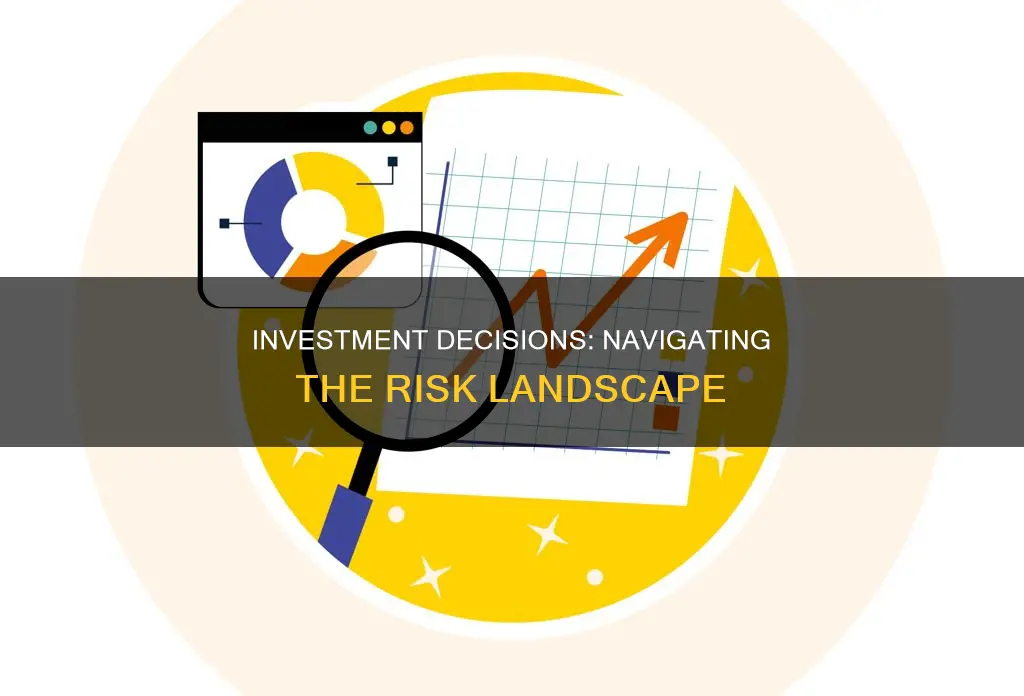
Risk is an important component of every investment, and there are many types of risk that investors face. For example, your investment value might rise or fall because of market conditions (market risk), or corporate decisions, such as whether to expand into a new area of business or merge with another company, can affect the value of your investments (business risk). If you own an international investment, events within that country can affect your investment (political risk and currency risk). Other types of risk include counterparty risk, which is the likelihood that one of those involved in a transaction might default on its contractual obligation, and liquidity risk, which is associated with an investor’s ability to transact their investment for cash.
| Characteristics | Values |
|---|---|
| Market risk | The investment value might rise or fall because of market conditions |
| Business risk | Corporate decisions, such as whether to expand into a new area of business or merge with another company, can affect the value of your investments |
| Political risk | Events within the country where you have an international investment can affect your investment |
| Currency risk | Events within the country where you have an international investment can affect your investment |
| Counterparty risk | The likelihood or probability that one of those involved in a transaction might default on its contractual obligation |
| Liquidity risk | Associated with an investor's ability to transact their investment for cash |

Market risk
External factors also contribute to market risk. Political events, such as changes in government policies, regulatory reforms, or geopolitical tensions, can influence market conditions and impact investment returns. For example, a change in tax policies or trade regulations can affect a company's profitability and, consequently, the performance of its stocks or bonds.
Additionally, market risk can be influenced by industry-specific factors. Developments within a particular industry, such as technological advancements, competitive dynamics, or regulatory changes, can impact the performance of investments tied to that industry. For instance, the introduction of new technologies can disrupt established businesses, affecting their financial stability and the value of associated investments.
To manage market risk, investors can diversify their portfolios across different asset classes, industries, and geographic regions. Diversification helps spread the risk and reduce the potential impact of market fluctuations on an investment portfolio. Additionally, investors can employ risk management strategies, such as setting stop-loss orders or using derivative instruments, to limit potential losses and protect their capital.
Small Cap Equities: Smart Investment, Big Returns
You may want to see also

Business risk
Risk is an important component of every investment. When you invest, you make choices about what to do with your financial assets. Risk is any uncertainty with respect to your investments that has the potential to negatively impact your financial welfare.
Another aspect of business risk is the impact of regulatory changes. Companies operating in highly regulated industries, such as healthcare or financial services, are particularly vulnerable to changes in government policies and regulations. For example, a change in tax laws or environmental regulations can significantly affect a company's profitability.
MFS Investment Management: Paying Primary Beneficiaries
You may want to see also

Political risk
One example of political risk is the impact of trade policies on international investments. If a country imposes tariffs or other trade restrictions on a company's products or services, it can reduce the company's profitability and, consequently, the value of investments in that company. Similarly, changes in tax policies can affect a company's bottom line and, by extension, the returns on investments.
It is worth noting that political risk is particularly relevant for international investments, as the events and decisions within a specific country can have a more direct impact on the investment's performance. However, political risk can also affect domestic investments, especially in industries that are heavily regulated or dependent on government contracts. As such, investors should carefully consider the potential political risks associated with their investments and factor them into their decision-making process.
Additionally, it is important to recognise that political risk can be mitigated through careful analysis and diversification. Investors can research and assess the political environment of a country or industry before investing, considering factors such as the stability of the government, the likelihood of policy changes, and the potential impact on specific sectors. By diversifying their investments across different countries, industries, and asset classes, investors can also reduce their exposure to specific political risks and protect their portfolios from potential negative impacts.
Understanding Professionally Managed Investment Entities: What, Why, and How?
You may want to see also

Counterparty risk
Risk is an important component of every investment. When you invest, you make choices about what to do with your financial assets. Risk is any uncertainty with respect to your investments that has the potential to negatively impact your financial welfare.
Similarly, in the case of stocks, counterparty risk arises from the possibility of the issuing company going bankrupt. Common stockholders are typically last in line to receive any proceeds from the liquidation of the company's assets. This means that if the company's bondholders and preferred stockholders have priority claims on the assets, common stockholders may be left with little or no return on their investment.
To mitigate counterparty risk, investors often conduct thorough due diligence on the counterparties involved in a transaction. This includes assessing the financial health, creditworthiness, and track record of the counterparty. Additionally, investors may require collateral or other forms of security to protect their interests in case of a default. Diversification of investments across multiple counterparties can also help reduce the overall counterparty risk exposure.
Smart Investment Strategies: Where to Invest Your Money
You may want to see also

Liquidity risk
For example, if you are a common stockholder and a company goes bankrupt and its assets are liquidated, you will be last in line to share in the proceeds. If there are any assets left after the company’s bondholders and holders of preferred stock have been paid, you will get whatever is left, which may be nothing.
There are a number of factors that can affect the liquidity of an investment, including the size and frequency of trades, the availability of buyers and sellers, and the regulatory environment. It is important for investors to carefully consider these factors and assess their tolerance for liquidity risk before making any investment decisions.
Breaking into Investment Management: Degrees Aren't Everything
You may want to see also
Frequently asked questions
Investment risk is the possibility that a negative financial outcome might occur. The level of risk associated with an investment typically correlates with the level of return the investment might achieve.
There are several types of investment risk, including model risk, nonsystemic risk, and management risk. Model risk occurs when a financial model used to make investment decisions is based on incorrect assumptions, data, or methodologies, leading to inaccurate predictions. Nonsystemic risk arises when an investor chooses to put their money into one company rather than another. Management risk refers to the possibility that a company's officers may make serious errors.
There are several ways to manage investment risk, including validating and periodically reviewing financial models, using multiple models to cross-check predictions and outcomes, and allocating and diversifying your investment portfolio. Understanding your own psychological tendencies and biases can also help you make more informed and rational decisions about your risk tolerance and investment strategies.







